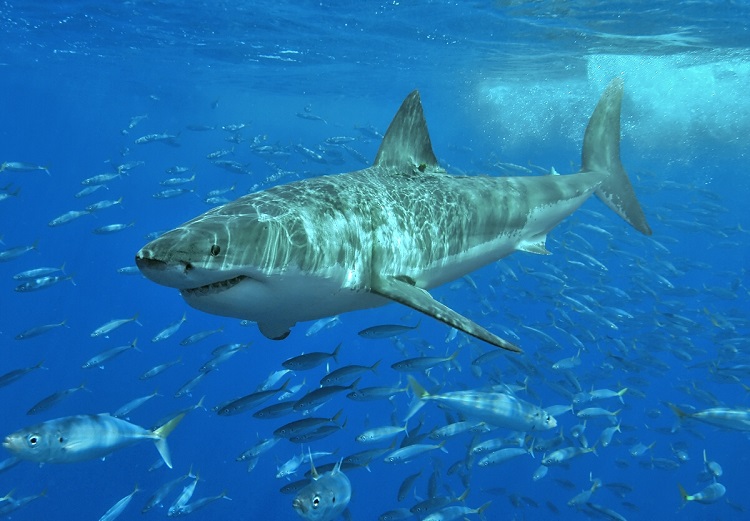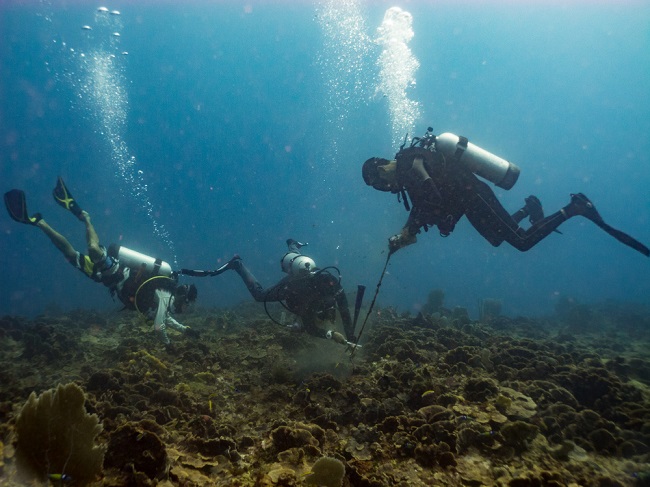Definition
Marine biology is the study of marine ecosystems, marine organisms, and human interactions with these environments and species. As a marine biologist, you may study a wide range of topics from the behavior, physiology, and ecology of specific groups of organisms to the interactions between human activity and aquatic environments.
Overview
The organisms that are studied by marine biologists vary greatly and include everything from the biggest whales to the smallest plankton. Marine biologists also study abiotic factors within the environment, such as the concentration of nutrients within the ocean. These types of studies help scientists understand the ocean in greater detail.
Since the Earth consists of approximately 71% water. This means that the majority of the Earth is covered in oceans. Marine biologists study every aspect of oceans, as they contribute many things humans need to survive. This could be the oxygen produced by algae in the ocean, to the fish harvested by billions of people every year for food.
A career in marine biology could lead to studying marine life, such as this great white shark and the fish that surround it. It also includes the fields of marine mammal training, researching the ocean, researching marine ecosystems and all other biological careers related to the ocean.

Marine Biology Careers
Many marine biologists perform research in all of the areas shown above and more. The field of marine biology is a very popular and therefore competitive field, but there are a variety of careers available. Employment can be found at a university, research centers, commercial fisheries, government agencies, and conservation groups.
The work environment can vary widely between jobs; some consist entirely of fieldwork, others are solely spent in the laboratory, and many jobs include work in both settings. Research technicians perform work that supports the research of professional marine biologists. While many technicians have a bachelor’s degree, most marine biologists have a master’s degree and/or a doctorate.
Marine Biology Major
Some marine biologists start out by obtaining a bachelor’s degree in biology. Then, they go on to graduate school in marine biology specifically. There are also universities that offer marine biology as a specific undergraduate major. This may be useful to those who know for sure that they want to go on to be marine biologists. However, a master’s degree or Ph.D. is required for most jobs beyond a technician position.
Undergraduates who major in marine biology take many of the same courses as general biology majors. Core biology courses are required for a general understanding of the field that upper-level courses build upon. In addition, most biology majors are required to take classes in subjects such as chemistry, physics, calculus, and statistics.
Marine biology majors in college focus more on marine biology classes after general classes have been taken. They may take classes on specific groups of animals, such as ichthyology. They also take more courses relating specifically to marine biology, such as marine ecology, conservation science, and physiology of marine life.
Branches of Marine Biology
By type of organism:
- Herpetology: the study of amphibians and reptiles, many of which live in or around the ocean.
- Ichthyology: the study of fish.
- Invertebrate zoology: the study of invertebrate organisms (organisms without a backbone). Many invertebrates are aquatic including sponges, crustaceans, and mollusks.
- Marine mammology: the study of cetaceans, which includes whales, dolphins, and porpoises.
- Phycology: the study of algae.
Other fields that are not necessarily organism-specific:
- Environmental Studies: marine biology is closely intertwined with the study of the environment. Marine biologists study how aquatic organisms are affected by rising ocean temperatures, water pollution, and ocean acidification.
- Fisheries and aquaculture: these fields involve the use of fish as a food source for humans. Fisheries are where fish are raised/farmed to be eaten. Some marine biologists work with fisheries and conduct research on overfishing, the sustainability of fish as a food source, and pollution levels. Aquaculture refers to research on farming specific species of fishes in order to learn how to best cultivate them as a food source.
- Marine biotechnology: this field involves biomedical applications of marine life. For example, scientists study how compounds from marine plants, animals, and microbes may be used in pharmaceuticals. The drug Ara-C, used to treat leukemia and non-Hodgkin’s lymphoma, and the drug Ara-A, used to treat herpes, are both derived from compounds found in a sea sponge.
History of Marine Biology
Humans have long been interested in oceans, but the relative inaccessibility of large bodies of water made them difficult to study for much of human history. The ancient Phoenicians, who lived in present-day Syria, Lebanon, and Israel, were one of the first peoples to conduct ocean expeditions. They navigated the vast ocean by using constellations as their guide.
However, they were primarily interested in oceans as a means of transportation and as a food source. They were not particularly interested in studying marine organisms, aside from determining whether those creatures were suitable as food. Later in history, people began to study marine organisms in more detail.
The ancient Greek philosopher Aristotle is considered to be the father of marine biology. His writings from the 4th Century B.C. include the first known references to specific marine animals such as fish, crustaceans, and mollusks, and he also recognized that whales were mammals and not fish. Aristotle even acknowledged that the oceans and continents slowly shifted over long periods of time, i.e., that seas could gradually fill and become land.
Modern Marine Biology
For a long time after Aristotle, no major research was done on the ocean and its life. Some even thought that Aristotle had discovered all that there was to know about the ocean. But with the beginning of the Scientific Revolution in the 16th Century, there was a renewed interest in studying natural history, including marine life, which led to an increase in research throughout the past few hundred years.
In the 18th Century, Captain James Cook led many oceanic voyages for the British Navy and discovered many new types of aquatic plants and animals. This inspired other naturalists for many years to come, including Charles Darwin. While Darwin is best known for his theory of evolution by natural selection, he also made important contributions to marine biology as a naturalist on the HMS Beagle.
During his 1831-1836 voyage, he collected and studied marine specimens which were then sent to the British Museum. Later in the 19th Century, the HMS Challenger, led by Sir Charles Wyville Thomson, explored the world’s oceans. Naturalists aboard the Challenger described 4,717 new species and collected 50 books’ worth of data. Later, institutions with the sole purpose of studying marine biology were built, such as the Station Biologique de Roscoff and the Woods Hole Oceanographic Institute.
Marine Biology Technology
A variety of technology has been developed to allow humans to explore the ocean, from the bathysphere (a spherical submersible used in the 1930s) to deep-sea submersibles, diving equipment, and remotely-operated vehicles. Still, only an estimated 20 percent of the world’s oceans have been explored.
Human activities such as overfishing, pollution, and building along the coastline can have profound effects on the world’s oceans, and in turn, create problems for the organisms that depend on oceans to survive. Technology has come a long way over the hundreds of years that science has analyzed the oceans. However, there are still many discoveries to be made!

